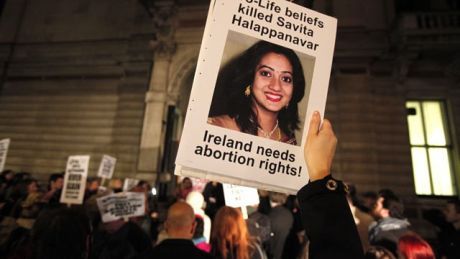Features
You are here
The struggle for abortion rights in Ireland

December 19, 2012
Savita Halappanavar died because women are not free to control their own bodies.
Halappanavar, who was a dentist in Galway, Ireland, was 17 weeks pregnant when she went to the hospital on October 21, bleeding from a spontaneous abortion (commonly known as a miscarriage). The hospital refused to treat Halappanavar because of Ireland’s total ban on all abortion services – even though the fetus she was carrying was not viable. Over the next few days, Halappanavar developed severe infections, which lead to multiple organ failure and finally, her death. She was 31 years old. Her death was completely preventable.
Halappanavar’s death sparked tremendous outrage in both Ireland and her native India. Thousands of people rallied in Ireland, demanding an end to the abortion ban, including an estimated 15,000 who marched from Dublin’s Garden of Remembrance to the Irish parliament, where they held a candlelight vigil. This is highly significant and encouraging in a country where women’s reproductive freedom has been consistently thwarted by the Catholic Church.
Following these protests, the Irish government announced upcoming legislation that will legalize abortion when medically necessary to save a woman’s life. Although this is nowhere near true reproductive freedom, it represents the first crack in the Church-sponsored anti-abortion laws.
Public anger at the senseless death of Savita Halappanavar is best seen in the context of the ongoing struggle of women in Ireland and the UK to gain full control of their own bodies. Until now, all abortion has been illegal in Ireland, including in Northern Ireland – making it the only part of the UK where the 1967 law legalizing abortion does not apply. Irish women who need abortions are forced to travel to England, putting basic termination services far out of reach of working class and low-income women.
The first Marie Stopes clinic in Ireland (similar to Planned Parenthood in the US) opened in Belfast just weeks before Halappanavar’s death, and the clinic offers limited abortion services. The clinic’s opening sparked pro-choice rallies throughout Ireland and a renewed public debate, with thousands of women and men demanding Ireland repeal its outdated, anti-women, anti-choice laws.
A volunteer group called Abortion Services Network (ASN) raises money to help women travel from Ireland to England to obtain abortions. The group was founded by a pro-choice activist who previously helped run a similar grassroots organization in New York City. In the US, almost 90 per cent of counties have no abortion provider, and anti-abortion laws force women to negotiate expensive and time-consuming obstacles in order to terminate a pregnancy. These laws disproportionately affect low-income women, who are less likely to have access to contraception, face greater barriers to travel and child care, and usually lack health insurance.
Although focused on the practical needs of women choosing to terminate pregnancies, ASN’s work has helped raise awareness of the need for abortion services in Ireland, and helped build public support for the opening of the Marie Stopes clinic. ASN and its American cousin, The Haven Coalition, are grassroots efforts created by women, for women, in places where government has actively obstructed women’s reproductive rights.
Reproductive rights activists in Ireland and the UK are determined to continue their struggle. Savita Halappanavar should not have died, and she should be the last woman in Ireland forced to choose between an unwanted or unviable pregnancy and her life.
Section:
- Log in to post comments










